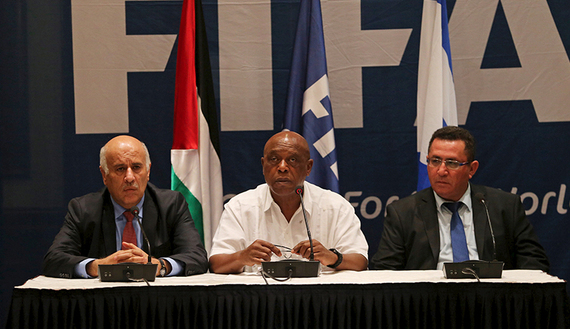By Andrew Warshaw
November 1 – Tokyo Sexwale, the under-fire South African official who headed FIFA’s doomed Israel-Palestine mediation effort, insists he did exactly what was asked of him and has questioned why his eagerly awaited report was thrown out by FIFA’s all-powerful Council headed by Gianni Infantino.
Yesterday the full extent to which FIFA washed its hands of the impasse in the region by dismissing Sexwale’s long-awaited findings which included a series of options and recommendations for settling the crisis, was laid bare by InsideWorldFootball.
Critics of Sexwale, an anti-apartheid campaigner turned prominent businessman who briefly ran against Infantino for FIFA president before pulling out of the race, claims his reputation has been badly damaged because of constant foot-dragging in trying to break the deadlock in the region.
But Sexwale insists his monitoring committee carried out its mandate to the full and implied he could have done no more in terms of advising FIFA of the best way forward.
“I gave FIFA options in terms of what it could do,” said Sexwale. “There were initially about 10 and we reduced them to three. Obviously there were consequences of each option and FIFA decided not to adopt any.”
“I have an opinion on whether the council took the right decision but for the moment it is irrelevant. The world doesn’t run on opinions. The monitoring committee, by definition, could only make recommendations, not take decisions. Unfortunately we did not have a mandate to take a decision. Had we been, there is no doubt I would have done so.”
Asked whether FIFA’s decision do nothing would find favour with international public opinion, Sexwale replied: “That’s a question for the FIFA leadership to come to terms with. It’s their decision. For us, we have discharged our mandate to study the situation and present a report.”
Although he wouldn’t admit it outright, Sexwale implied he was not happy with FIFA’s constant delaying tactics, which came to a head at last May’s FIFA Congress in Bahrain when Infantino unilaterally refused to allow a vote on a Palestinian motion to discuss Sexwale’s findings.
“Let me make it very clear,” said Sexwale. “From our part there has not been any delay. My report was ready in Bahrain but they decided to take the matter off the agenda.”
Despite all the negativity, Sexwale insisted “marked progress” had been made in terms of the movement of players, officials and equipment in the occupied territories. “When we started it was almost Mission Impossible,” he said. “It could take hours and hours for Israeli security officials to go through searches and equipment could lie there for months.”
This, said Sexwale, had improved significantly as a result of his committee bringing the two parties together though he added: “That doesn’t mean there were no challenges. In some situations players were stopped, players were arrested.”
And he painted a particularly bleak picture over the five Israeli clubs playing in the Occupied Territories – the issue at the heart of his mandate.
“On this there was no progress because there are issues around who plays where, where is the border etc etc,” he said. “This was the stumbling block, the intractable question.”
“The problem FIFA confronts is that the Palestinian Football Association, which is a FIFA member, has got to play in a part of the world which is not recognised by Israel as a state. Many countries and international organisations recognise that these territories belong to Palestine but that is disputed by the Israelis. As a result football is in limbo. But we did not fail. Failure would have been not producing recommendations and saying nothing.”
Contact the writer of this story at moc.l1751321572labto1751321572ofdlr1751321572owedi1751321572sni@w1751321572ahsra1751321572w.wer1751321572dna1751321572

